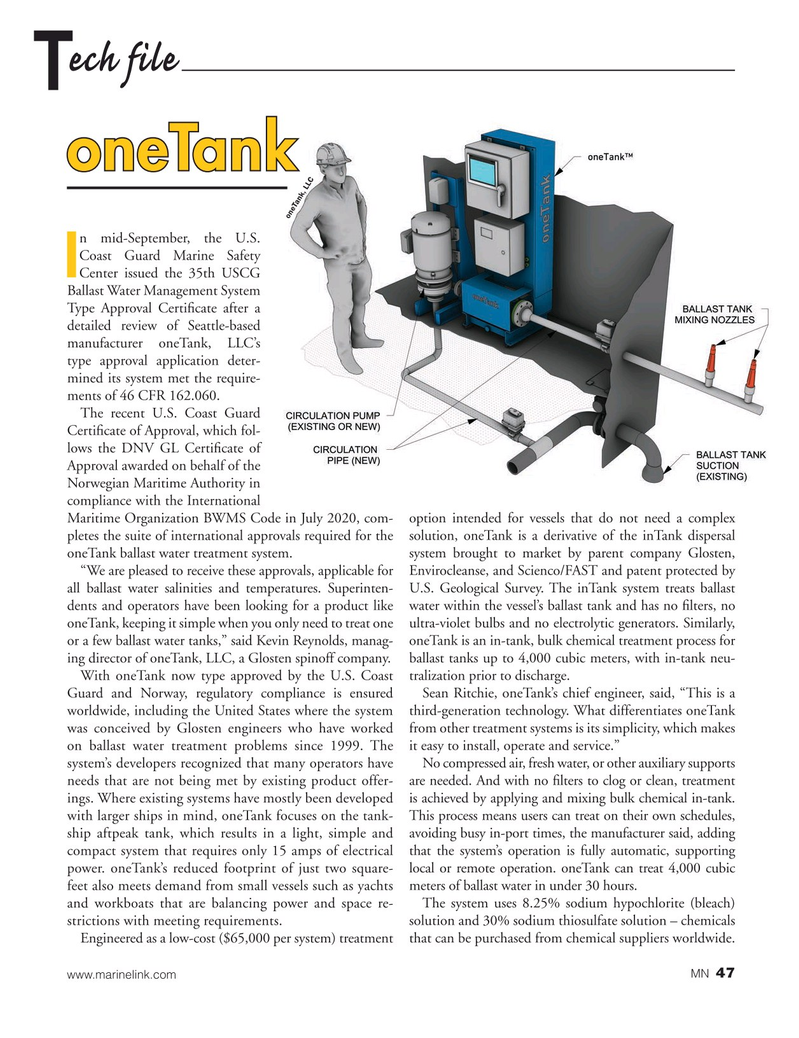
Page 47: of Marine News Magazine (October 2020)
Shipbuilding & Repair
Read this page in Pdf, Flash or Html5 edition of October 2020 Marine News Magazine
ech file
T oneTank oneTank, LLC n mid-September, the U.S.
Coast Guard Marine Safety
I
Center issued the 35th USCG
Ballast Water Management System
Type Approval Certi? cate after a detailed review of Seattle-based manufacturer oneTank, LLC’s type approval application deter- mined its system met the require- ments of 46 CFR 162.060.
The recent U.S. Coast Guard
Certi? cate of Approval, which fol- lows the DNV GL Certi? cate of
Approval awarded on behalf of the
Norwegian Maritime Authority in compliance with the International
Maritime Organization BWMS Code in July 2020, com- option intended for vessels that do not need a complex pletes the suite of international approvals required for the solution, oneTank is a derivative of the inTank dispersal oneTank ballast water treatment system. system brought to market by parent company Glosten, “We are pleased to receive these approvals, applicable for Envirocleanse, and Scienco/FAST and patent protected by all ballast water salinities and temperatures. Superinten- U.S. Geological Survey. The inTank system treats ballast dents and operators have been looking for a product like water within the vessel’s ballast tank and has no ? lters, no oneTank, keeping it simple when you only need to treat one ultra-violet bulbs and no electrolytic generators. Similarly, or a few ballast water tanks,” said Kevin Reynolds, manag- oneTank is an in-tank, bulk chemical treatment process for ing director of oneTank, LLC, a Glosten spinoff company. ballast tanks up to 4,000 cubic meters, with in-tank neu-
With oneTank now type approved by the U.S. Coast tralization prior to discharge.
Guard and Norway, regulatory compliance is ensured Sean Ritchie, oneTank’s chief engineer, said, “This is a worldwide, including the United States where the system third-generation technology. What differentiates oneTank was conceived by Glosten engineers who have worked from other treatment systems is its simplicity, which makes on ballast water treatment problems since 1999. The it easy to install, operate and service.” system’s developers recognized that many operators have No compressed air, fresh water, or other auxiliary supports needs that are not being met by existing product offer- are needed. And with no ? lters to clog or clean, treatment ings. Where existing systems have mostly been developed is achieved by applying and mixing bulk chemical in-tank. with larger ships in mind, oneTank focuses on the tank- This process means users can treat on their own schedules, ship aftpeak tank, which results in a light, simple and avoiding busy in-port times, the manufacturer said, adding compact system that requires only 15 amps of electrical that the system’s operation is fully automatic, supporting power. oneTank’s reduced footprint of just two square- local or remote operation. oneTank can treat 4,000 cubic feet also meets demand from small vessels such as yachts meters of ballast water in under 30 hours.
and workboats that are balancing power and space re- The system uses 8.25% sodium hypochlorite (bleach) strictions with meeting requirements. solution and 30% sodium thiosulfate solution – chemicals
Engineered as a low-cost ($65,000 per system) treatment that can be purchased from chemical suppliers worldwide.
47 www.marinelink.com MN

 46
46

 48
48
